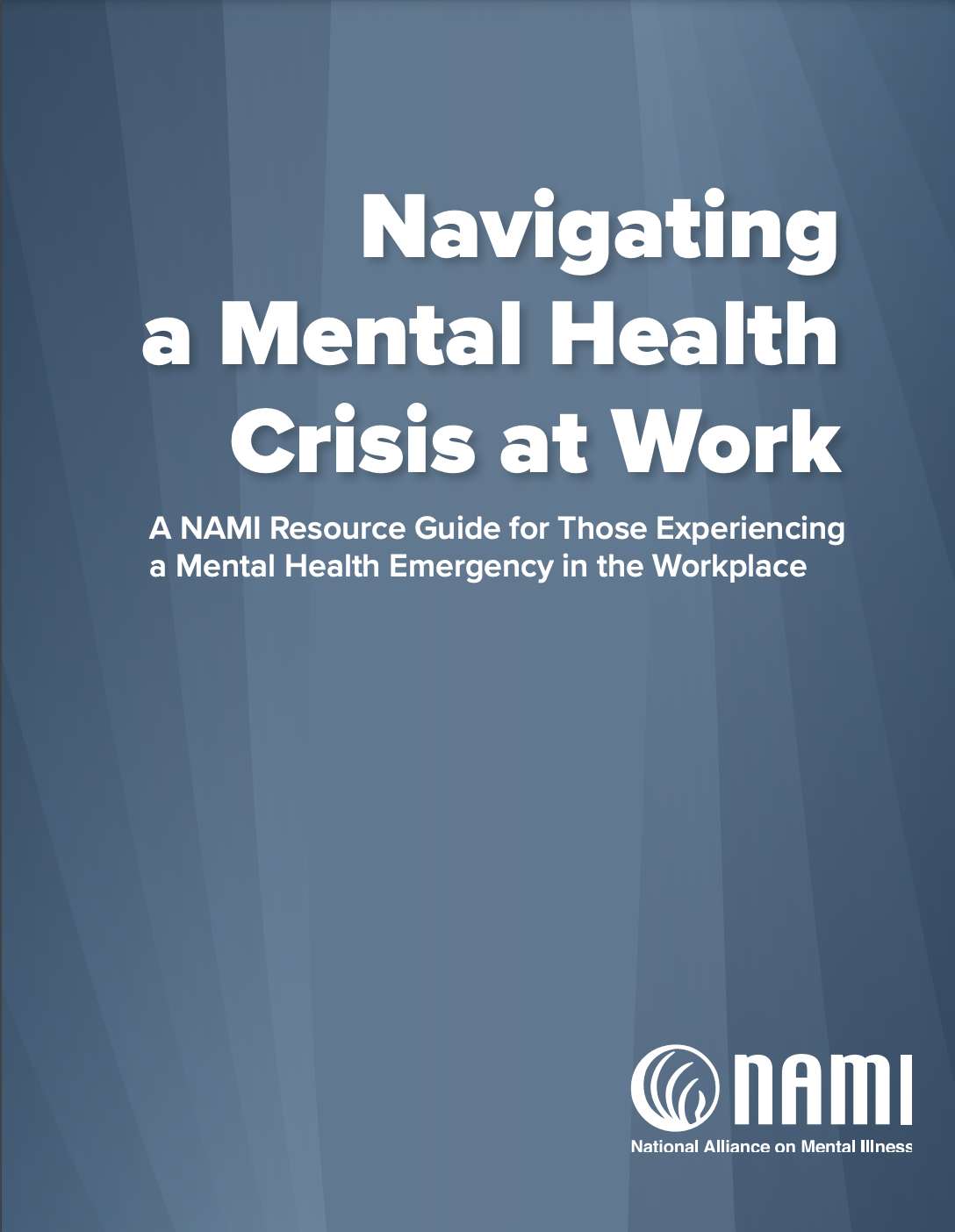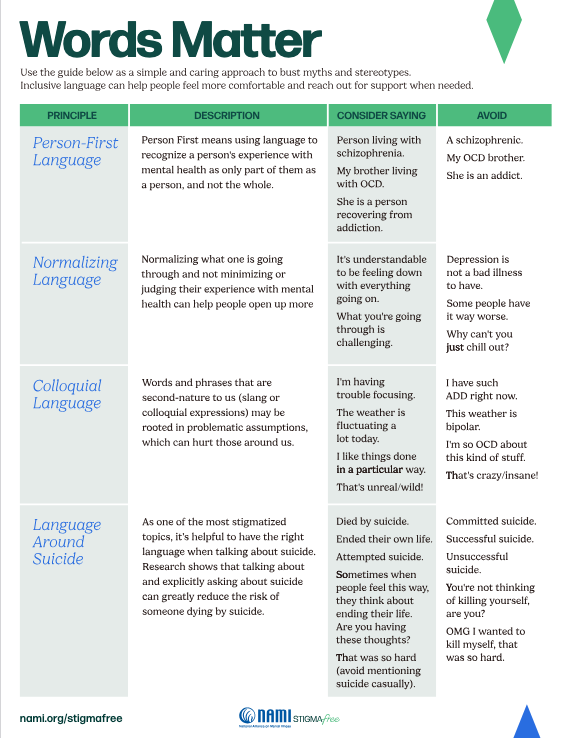Caring for a loved one can be rewarding and challenging at the same time, especially when balancing work and other life responsibilities. In fact, more than one in three working caregivers reported balancing caregiving with their jobs was their biggest source of stress.1,2
Of the 53 million caregivers in the U.S., at least 8.4 million people provide care to an adult with a mental health concern.3,4 Additionally, nearly a quarter of adults have both a parent and a child they support in some way, contributing to significantly more financial and emotional stress for this “sandwich generation.”5 This guide offers tips on handling stress as a caregiver with a mental health condition, and provides suggestions on how to support employees with caregiving responsibilities.
Who is a Caregiver?
A caregiver is anyone who provides support to a family member or loved one – including children of any age, parents, siblings, partners, family members, and friends. Support can include bringing a person to their medical appointments, taking care of household chores, or financially supporting someone who cannot support themselves.
Signs of Caregiver Stress
It’s not uncommon to overlook your own needs when focused on someone else’s. As a caregiver, you may be so preoccupied by your loved one’s care that you miss signs of stress affecting your own health and well- being. In fact, 47% of caregivers have experienced increased anxiety, depression, or other mental health concerns in the past year.6

Signs of Caregiver Stress Include:
- Worrying all the time
- Feeling unusually sad
- Becoming easily annoyed or angry
- Losing interest in activities
- Feeling tired often
- Sleeping too much or not enough
- Having frequent health problems
- Misusing alcohol or drugs
- Neglecting your own health & well-being
60% of caregivers felt burned out because of their job in the past year.7 Managing burnout at work is a team effort, and it’s important to talk to your manager to ensure a holistic approach to prevention.
Ways That You Can Manage Caregiver Stress
- Create simple, sustainable routines. Set and stick to a sleep schedule. Eat well-balanced meals. Drink plenty of water. Exercise in the way you’re most comfortable.
- Surround yourself with supporters. Make time each week to see people who lift you up and lighten your load. NAMI Family Support Groups are a no-cost opportunity to learn coping strategies and connect with people who face similar challenges.
- Ask for and accept help. Recognize when you’re spread too thin; connect with supporters who can help with errands, meals, or provide a break from caregiving. Say no to things that are draining, such as hosting holidays.
- Learn about mental illness. Knowledge is power! By learning more about your family member’s illness, you can better collaborate with your loved one to support their recovery. NAMI Family-to-Family is a free mental health education program by and for family members supporting a loved one with mental illness. Visit nami.org for resources.
- Give yourself permission to feel what you feel. Recognize that it’s okay to feel two emotions side-by-side. “I feel sad about my loved one’s situation, and I also resent the burden on me.”
- Take care of your health. Tell your health care professional that you’re a caregiver. Share the stressors or symptoms you are experiencing. Get regular health screenings and consider seeing your own therapist.
- Learn about workplace benefits for caregiving. Meet with your manager or HR representative to discuss the policies and resources that may be available, such as flexible work schedules and resource referrals.
- Reinvent family life. Spend time together as a family in whatever ways are most comfortable for you and your loved one. Adapt family traditions or create new rituals, such as a walk at sunset, game or movie night and more.
As a caregiver, your well-being is essential both at work and at home. By taking care of yourself, you’re better equipped to take care of others.
If you find yourself struggling with your mental health, remember that you are not alone. NAMI has a HelpLine you can call or text if you want help finding or understanding resources for yourself or a loved one. You can also call or text 988, the Suicide and Crisis Lifeline to be connected with a trained counselor who will offer compassionate and accessible support, resources and referrals to community care.
CITATIONS
- Harrington, E., McInturff, B. (September 2021). Working While Caring: A National Survey of Caregiver Stress in the U.S. Workforce Key Findings. Rosalynn Carter Institute for Caregivers. https://rosalynncarter.org/wp-content/uploads/2021/09/210140-RCI-National-Surveys-Executive- Summary -Update-9.22.21.pdf
- Cobbe, T., Mumford, D. et al. (May 2024). Working while caregiving: It’s complicated. S&P Global. https://www.spglobal.com/content/dam/spglobal/global-assets/en/special- reports/Workingwhilecaregiving_Itscomplicated.pdf
- AARP and National Alliance for Caregiving. (May 2020). Caregiving in the United States 2020. AARP. https://doi.org/10.26419/ppi.00103.001
- Mental Health America, National Alliance for Caregiving, National Alliance on Mental Health. (February 2016). On Pins and Needles: Caregivers of adults with mental illness. National Alliance for Caregiving. https://www.caregiving.org/wp-content/uploads/2020/05/NAC_Mental_Illness_Study _2016_FINAL_WEB.pdf
- Office of the Surgron General. (August 2024). Parents under pressure: The U.S. Surgeon General advisory on the mental health and well-being of parents. U.S. Department of Health & Human Services. https://www.hhs.gov/surgeongeneral/priorities/parents/index.html
- The Guardian Life Insurance Company of America. (2023). Guardian 12th Annual Workplace Benefits Study: Standing Up and Stepping In. Guardian. https://www.guardianlife.com/reports/caregiving-in-america
- NAMI. (2024). The 2024 NAMI Workplace Mental Health Poll. https://nami.org/2024workplace


